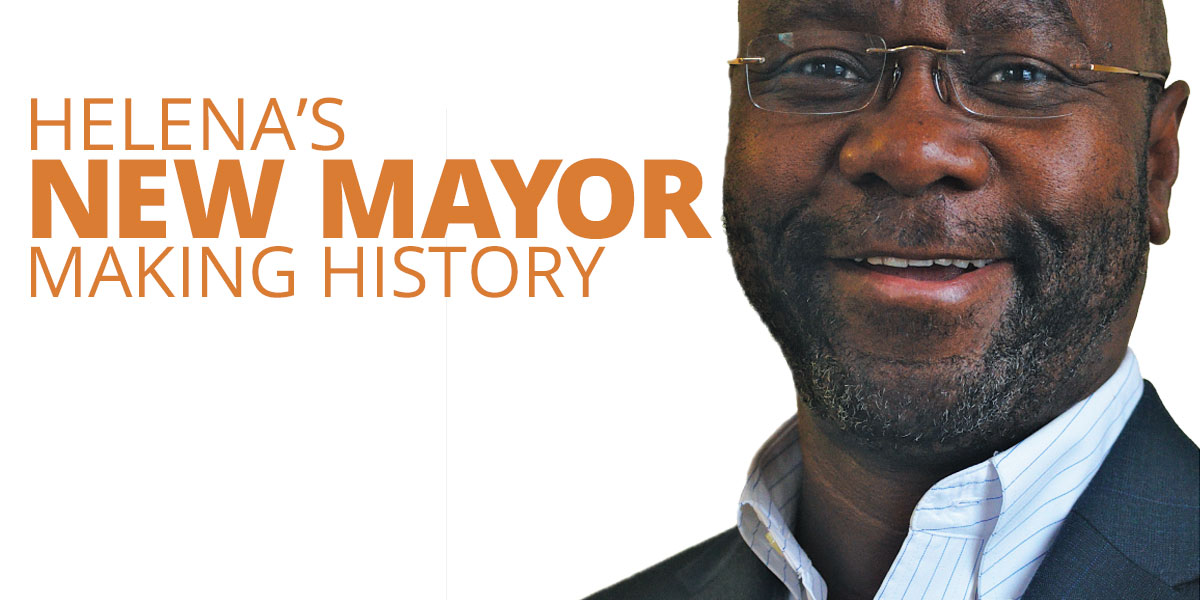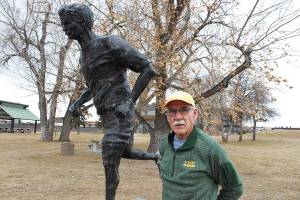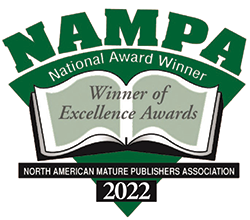Wilmot Collins made history in November by becoming the first African-American to serve as mayor in Montana’s capital city. Running as a progressive, he unseated long-time and well-liked incumbent Jim Smith, a democrat. His victory has come with a little more fanfare and fame than expected.
“I’ve been interviewed by every news station from NBC to NPR, and by The Guardian, and a dozen others,” Collins said. “But if this is good for our community, I am all for it.”
“Community” is word that happens to come up often in conversation with the new mayor. Having had to flee the place you once called home to seek out a safe environment in which to raise a family has clearly helped shape the way he feels about Helena.
“This community helped raise and shape my two beautiful children,” he said. “I want to give something back and help make that happen for other people.”

Photo courtesy Wilmot Collins
Collins and his wife, Maddie, immigrated to the US as refugees from Liberia. The Civil War in his home country (1989-1997) forced them to go to neighboring Ghana, where they lived as refugees for a year.
His wife happened to have been an exchange student at Helena High in 1984, and she suggested they try to emigrate to Montana. She went first, pregnant with their daughter, while Collins took advantage of a cease-fire to try and get his teaching job back in Liberia.
He had to flee a second time, this time to The Ivory Coast. He spent two years there as a refugee in a French-speaking country where he did not know the language.
“I was literally homeless there, on the street.” But then he smiled and related one of those simple twists of fate that change lives.
“I was walking down a street and heard someone call my name, my last name, which meant it had to be someone who knew me very well. In Liberia you use the last name only if you are very close with someone.”
The man calling him turned out to be his best friend from high school, a man who was able to help him connect with the United Nations to begin the process of immigrating to the U.S. to rejoin his wife and daughter.
“I did not see them at all for two years and seven months,” he said, tearing up at the memory. “And for four months we had no contact at all. My wife did not know whether I was alive or dead.”
After a two-year vetting process in which he was scrutinized and interviewed by every U.S. agency, from the State Department to the Immigrations and Naturalization Service, from the FBI to Homeland Security, Collins was finally granted a travel visa.
“I landed at JFK airport after 22 hours of flying,” he said, “and entered this country with 25 cents in my pocket. I had to ask a passerby for a dime so I could call my wife in Helena to tell her I was in the U.S., because a phone call at that time cost 35 cents!”
His UN plane ticket provided passage to Helena where he could reunite with his wife and daughter.
He disembarked to a cheering crowd that included students and faculty from both Helena High and Carroll College. Someone carried a sign saying “Welcome Home, Collins.”
The family in Helena who had hosted Maddie back in 1984 as a high school cultural exchange student was Bruce and Joyce Nachstheim, and in 1992 they helped her contact the federal agencies to initiate the long, drawn-out procedures that would get her husband to Montana.
Nachtsheim, a former F.B.I. agent in East St. Louis, had switched careers in the ‘70s, relocating his own family to Helena, where he had a long career as a beloved and respected teacher, first at Helena High, and later Capital High. He eventually became an assistant principal for Capital.
“Bruce contacted Senator Conrad Burns and Senator Baucus and Congressman Pat Williams on our behalf,” Collins explained. “And meanwhile, Maddie earned a scholarship at Carroll College to study nursing.”
Once in Helena, he wandered the streets, getting to know his new hometown and looking for work. On a whim, he walked into the Capitol and found the office of Governor Marc Racicot.
“I am here to meet the governor,” he announced. “Do you have an appointment?” the secretary asked. Collins was about to say “no” when a man behind him touched his shoulder.
“Can I help you?” the man asked. “I’m Marc Racicot.”
The governor invited him into his office and asked to see the resume Collins carried with him everywhere. Based on the educational background and credentials, one of the governor’s assistants said she knew of an organization that was hiring.
Less than two weeks later, Collins began working for Intermountain Children’s Home, a post he held for three years before moving onto Alternative Youth Adventures in Boulder, where he led adjudicated youth on 60-day backcountry experiences.
Over time, he has served his community in a number of similar roles, working for The Casey Family Program, for example, the Florence Crittenton Home, Veterans Affairs, and currently for Child Protective Services.
Along the way, he joined the Army National Guard and then transferred to the Navy, and is presently eight months away from retirement from the Naval Reserve.
For a time, he even worked for Homeland Security, in the very place that he had taken his oath as a U.S. citizen after a seven-year application process.
“I came here a refugee from Africa, and a few weeks later I was working at Intermountain,” he explained. “Ever since, my message has been, ‘Refugees are not looking for a handout. They are looking for a second chance.’”
Twenty-three years after his first arrival in Helena, Wilmot Collins decided to run for Mayor of Helena, against a popular incumbent, Jim Smith. “I knew this would be a close race,” Wilmont said, “because Jim is a good man. Everyone likes Jim. I like Jim! But this race was not about Jim. This campaign was about my own desire to give back to this community.”
He told the story of how a few months after their family settled in Helena, a neighbor knocked on the door to report some racial slurs that vandals had spray-painted on their house.
“While I went inside to call the police to report what had happened,” he explained, “this woman went around and gathered the neighbors to all come over and scrub the spray paint off our house. You see, that’s the community I want to live in: I don’t think of the negative part of that experience. There are bigots wherever you go, but I want to live in a place, and raise my children in a place, where your neighbors are good people and will come help you wash that stuff off your house. This community is full of good people.”
Collins’s choice to run for mayor was itself a testament to progress and a statement about community.
“A black man comfortable enough to run for mayor—that said something,” he remarked.
Now that he’s made history, Collins is determined to lead Helena into a progressive future, with essential services at the top of his agenda.
“In 1978, Helena had six people per shift in the Fire Department, and they fielded 302 calls that year. In 2016, we had seven people per shift, and they fielded 5,300 calls. Seventy-five of those calls were delayed, and in 15 cases, the department could not show up at all.”
But Collins is not naive—he is always quick to point out that services come at a financial cost. “The community must do its part to make sure those essential services are available.”
In winter, as he took office, it was snow removal that was on everyone’s mind.
“I have been on the job for just a week, and I am living and dreaming about snow,” he said. “I know how important it is to our downtown businesses to keep the streets clear. Helena is a community with a large population of elderly people, and we need to make sure they are comfortable getting around on the streets and sidewalks.”
Like everything else in a city budget, the constraint is money.
“This city operates on a very small budget: 76 million dollars for the entire city for each year. The amount allocated for snow removal is a small fraction of that. I am frustrated too,” he said, “but I know the problem is not the crews. Those guys are out working all the time. I want to tell people we are on it! But we only have 12 trucks.”
Being a high-profile mayor has not gone to Collins’ head. “If the publicity I have generated will help my community, I would do it all again. For me, this is all about moving the community forward in a positive direction.
A lot of people who called me after the election had never heard of Helena, Montana. My hope is that people around the country may hear of what happened here and say to themselves, ‘Hey, that place sounds like a good community, with progressive people—maybe I will open a branch of my business there.’ That would be good for the community.”
Officially speaking…
Liberia, a country in West Africa, has a history intimately tied to the U.S. from its very origin. Formed as a country in the 1820s, to which freed American and Caribbean slaves could repatriate, it achieved self-governance in 1847.
The first freed slaves to depart the U.S. to return to Africa left in 1820, aboard a ship called The Mayflower of Liberia. The capital of the country is Monrovia, named thus in honor of James Monroe, fifth U.S. President and an advocate for the formation of a colony in Africa for freed and former slaves. Only one other world capital is named for a U.S. president: Washington, D.C.
At an inaugural celebration for the newly elected Collins, Diego Rivas introduced the new mayor with glowing praise and then acknowledged that the campaign had revealed some prejudice in the community.
But Rivas brightened the room with a joke, suggesting, “perhaps Wilmot should announce that, from now on, all city business will be conducted in the official language of Liberia.”
The joke, of course, hinged on the fact that, even though we do not have an official language in the U.S., Liberia does have an official language.
And that official language is English.












